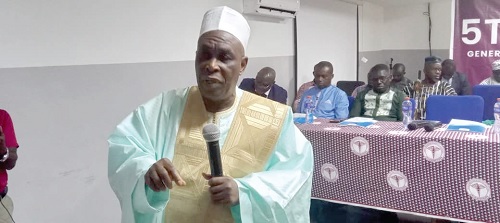
Find early resolution to labour issues - Labour expert advises govt
The government has been advised to have an early resolution of issues that would come up within labour to prevent strikes and ensure sanity on the front of the labour front this year.
This must be done with a certain dedication on the part of the Ministry of Employment and Labour Relations and various management of government agencies and establishments.
Labour and alternative dispute resolution (ADR) expert, Austin Gamey, who gave the advice, said ensuring peace on the labour front required a certain skill set on the part of any manager, minister, President or Vice- President and “this means that they would have to be knowledgeable and have an understanding of the practice of the law.”
In an interview with the Daily Graphic, Mr Gamey said with the year being an election one and also economic challenges yet to ease, it would be important for the government and its operatives to engage labour to ensure calm.
Negotiations, communication
Citing the Labour Act, Section 101(2), Mr Gamey said it enjoined all employers and unions to have ground rules or cardinal rules that would govern the procedure of all their negotiations and subsequent dealings during the implementation of any agreement they might have been reached.
Mr Gamey, a former Minister of Employment & Social Welfare charged employers to endeavour to share information with employees as the law enjoined them to share relevant information during negotiations.
“Employers in Ghana oftentimes do not like to share information because they feel it is their right as employers not to share certain information.
“But in this world today, you don’t do that, you have to share and the law in Section 97 enjoins the employer to share that relevant information.
The only thing you cannot share is the personal pay of everybody,” he said.
Sticking point
Mr Gamey, who is the Chief Executive Officer (CEO) of the Pulse Institute Africa, said one of the issues that were likely to be a sticking point was the 15 per cent VAT to be charged on electricity.
He said that was going to attract reactions from the unions since the development would affect their members and urged the government to put in an effective communication machinery to deal with the issue.
"The Government would have to be sharp and be forthcoming and invite experts who have a better appreciation of how these things are done to assist them," he said and emphasised that failure to do that could result in the government suffocating from the pressures of labour.
He said labour would be legitimate in making demands to cushion members in the wake of the increase.
VAT on electricity
The Ministry of Finance announced the implementation of the 15 per cent VAT for residential customers of electricity above the maximum consumption level specified for block charges for lifeline units in line with Sections 35 and 37 and the First Schedule (9) of Value Added Tax (VAT) Act, 2013 (ACT 870) effective January 1, 2024.
The move formed part of the implementation of the Government's Medium-Term Revenue Strategy and the International Monetary Fund (IMF) Supported Post Covid-19 Programme for Economic Growth (PC-PEG), the Ministry said.
A statement issued by the ministry said VAT was still exempt for a supply to a dwelling of electricity up to a maximum consumption level specified for block charges for lifeline units in line with Sections 35 and 37 and the First Schedule (9) of Act 870.
